How Geotheta can Save You Time, Stress, and Money.
Table of ContentsThe Geotheta PDFsFacts About Geotheta RevealedThe Geotheta DiariesThe 7-Second Trick For GeothetaExamine This Report about Geotheta

They perform website investigations, collect samples, do research laboratory tests, and analyze data to review the suitability of the ground for building jobs - Geotechnical Engineers. Based upon their searchings for, geotechnical engineers give referrals for foundation layout, incline security, keeping structures, and mitigation of geotechnical risks. They collaborate with various other experts, such as engineers, structural engineers, and building and construction teams, to guarantee that geotechnical factors to consider are incorporated into the overall project design and application
By analyzing the behavior and properties of soil and rock, they can determine prospective geotechnical risks such as landslides, soil negotiation, or slope instability. Their knowledge assists stop failings or accidents that can endanger lives and residential property. Right here are some detailed tasks and obligations of a geotechnical engineer: Website Examination: Geotechnical designers conduct site examinations to collect information on subsurface conditions.
They analyze the information to understand the residential properties and habits of the dirt and rock, including their toughness, permeability, compaction qualities, and groundwater conditions. Geotechnical Analysis and Layout: Geotechnical engineers assess the information gathered throughout site examinations to assess the security and viability of the website for building tasks. They perform geotechnical calculations and modeling to examine aspects such as bearing capability, settlement, incline security, side earth pressures, and groundwater circulation.
Geotheta Can Be Fun For Everyone
Foundation Layout: Geotechnical engineers play a vital duty in developing foundations that can safely sustain the intended framework. They analyze the soil problems and tons demands to establish the suitable foundation type, such as shallow structures (e.g., grounds), deep structures (e.g (https://www.blogtalkradio.com/geotheta)., heaps), or specialized techniques like soil enhancement. They consider variables such as settlement limitations, birthing capacity, and soil-structure interaction to develop ideal structure layouts
They evaluate building and construction plans, monitor website tasks, and conduct area examinations to confirm that the design recommendations are adhered to. If unanticipated geotechnical problems emerge, they analyze the circumstance and give recommendations for removal or adjustments to the style. Danger Analysis and Reduction: Geotechnical engineers assess geotechnical hazards and dangers associated with the project website, such as landslides, liquefaction, or soil disintegration.

Cooperation and Communication: Geotechnical engineers function very closely with other experts associated with a project, such as architects, structural engineers, and construction teams. Efficient communication and partnership are important to incorporate geotechnical factors to consider into the general project style and building directory and construction procedure. Geotechnical engineers supply technical experience, solution queries, and ensure that geotechnical requirements are fulfilled.
Little Known Questions About Geotheta.
Below are some kinds of geotechnical designers: Structure Engineer: Structure engineers specialize in creating and analyzing structures for frameworks. They analyze the soil problems, lots demands, and site characteristics to establish one of the most suitable foundation kind and layout, such as shallow foundations, deep structures, or specialized methods like pile foundations.
They review the factors affecting slope stability, such as soil residential properties, groundwater problems, and incline geometry, and create methods to avoid incline failings and minimize risks. Earthquake Engineer: Earthquake engineers focus on analyzing and making structures to withstand seismic pressures. They evaluate the seismic hazard of a site, evaluate dirt liquefaction capacity, and establish seismic layout requirements to guarantee the safety and durability of frameworks throughout quakes.
They execute area screening, accumulate samples, and examine the accumulated information to characterize the dirt residential properties, geologic formations, and groundwater problems at a website. Geotechnical Instrumentation Engineer: Geotechnical instrumentation designers concentrate on surveillance and determining the behavior of soil, rock, and frameworks. They set up and keep instrumentation systems that keep track of elements such as soil negotiation, groundwater degrees, slope motions, and structural variations to assess efficiency and supply early warnings of prospective concerns.
The Only Guide to Geotheta
They perform tests such as triaxial examinations, combination tests, direct shear tests, and permeability examinations to collect information for geotechnical evaluation and design. Geosynthetics Engineer: Geosynthetics engineers concentrate on the design and application of geosynthetic products, such as geotextiles, geogrids, and geomembranes. They make use of these materials to boost dirt stability, reinforce inclines, give water drainage services, and control erosion.
They have a tendency to be investigatory individuals, which suggests they're intellectual, reflective, and investigative. They are interested, methodical, logical, analytical, and sensible. Some of them are additionally social, implying they're kind, generous, participating, individual, caring, handy, understanding, tactful, and friendly - Consulting Engineers.
In the office setting, geotechnical engineers use specialized software devices to execute calculations, produce designs, and assess information. They prepare records, evaluation project requirements, interact with customers and staff member, and coordinate job activities. The workplace setting offers a helpful setting for research, evaluation, and partnership with various other specialists associated with the job.
Geotheta Things To Know Before You Get This
They often see project sites to conduct website investigations, assess geotechnical conditions, and gather data for evaluation. These brows through involve traveling to different locations, in some cases in remote or difficult terrains. Geotechnical engineers may carry out soil sampling, conduct examinations, and display building and construction tasks to ensure that the geotechnical elements of the task are being carried out correctly.
Geotechnical engineers additionally work in specialized geotechnical labs. In these facilities, they carry out experiments, do examinations on soil and rock samples, and analyze the engineering homes of the products. Geotechnical research laboratory designers function extensively in these settings, taking care of screening devices, operating instruments, and tape-recording information. They collaborate with other research laboratory staff to ensure exact and reliable testing results.